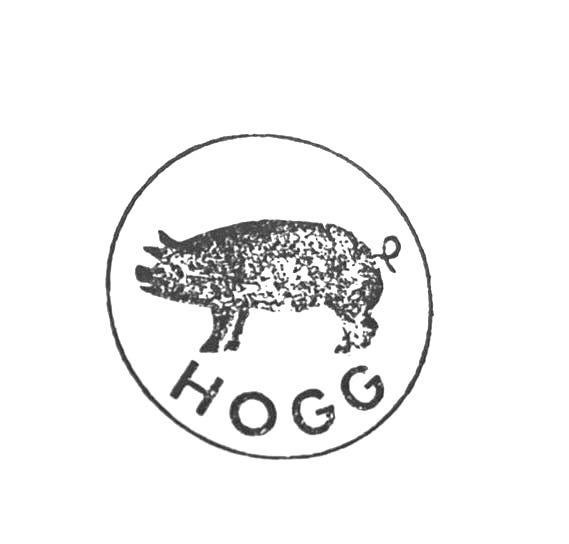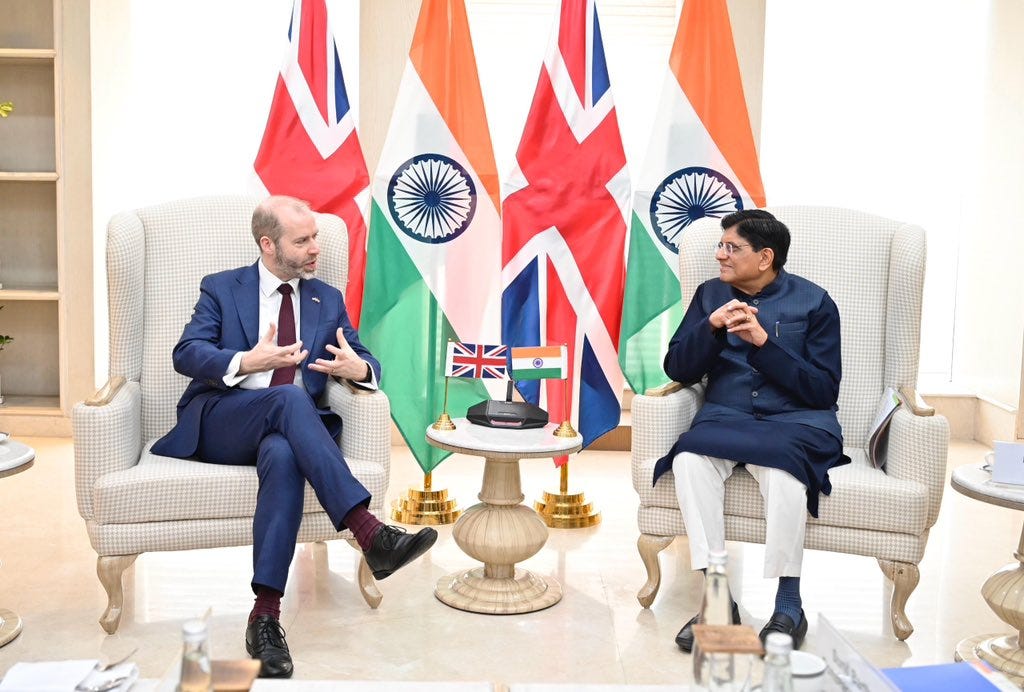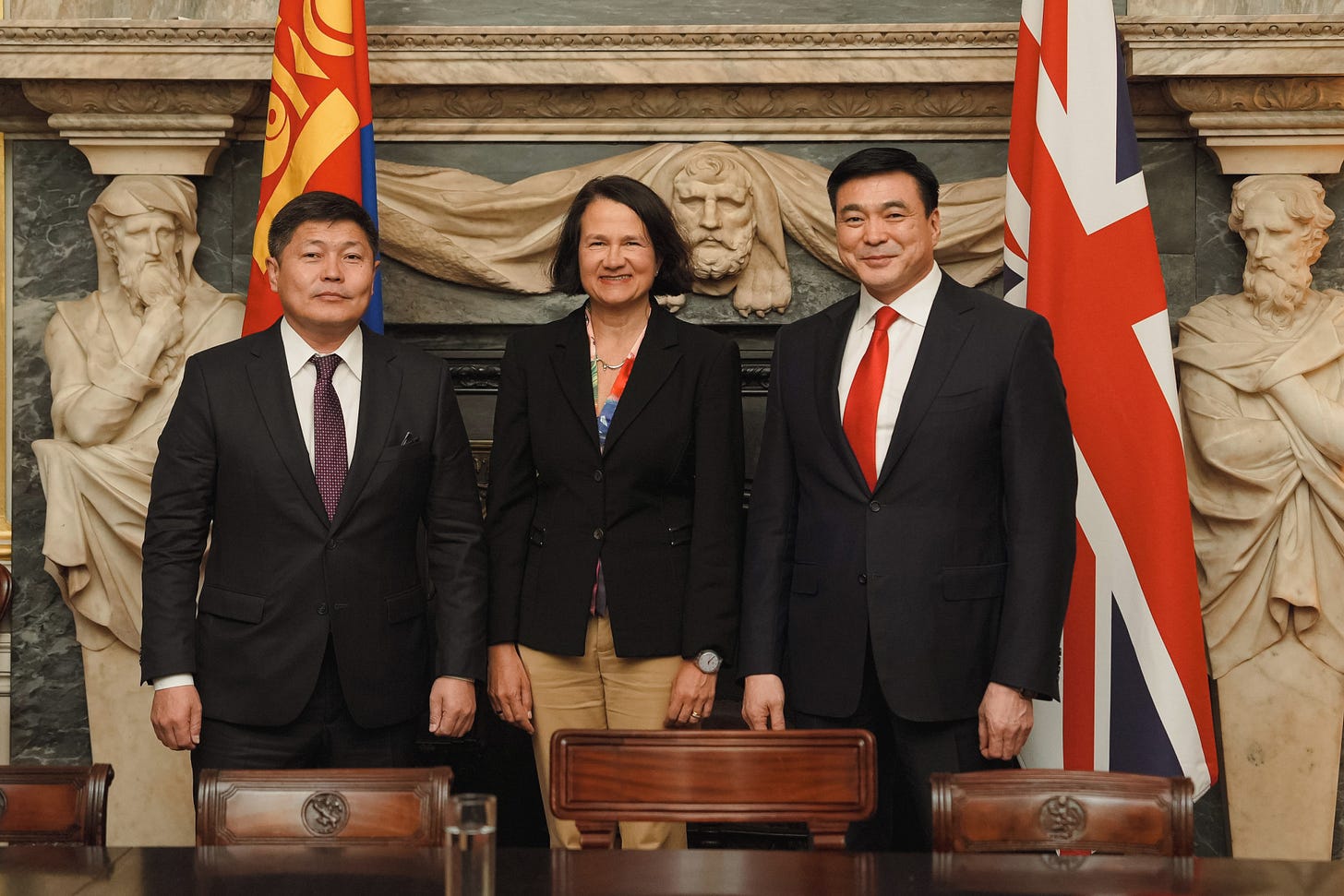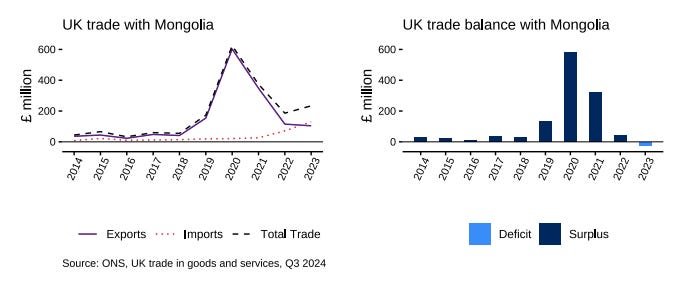Telegram 012
Ukraine anniversary, Starmer in Washington, India trade talks: Sam Hogg's British Diplomacy Tracker
As a reminder: all opinions expressed in these Telegrams are my own personal opinions, not my employers. This is a project I run for fun in my free time.
Hello,
In August 1969, Lee Kaun Yew set out to deliver a speech taking stock of the situation his nation faced. Singapore’s first Prime Minister was a decade into his role, and the world around his small, new, developing country was in flux. He knew that while some decisions he made now would be instantly impactful, the success or failure of others would be measured in decades, increasing or damaging the probability of Singapore’s survival.
1969 was one of the years that come around every century and seem to condense an entire era into a handful of days. The Beatles had just played their first public concert, and Jimi Hendrix, Janis Joplin, and The Who would shortly play at Woodstock. A month prior, the first human being had set foot on the moon. The Cold War was in motion, playing out through proxies across Africa and Lee’s neighbourhood, South East Asia. America, which had just passed $1.006 trillion in GDP, had troops on the ground in Vietnam and would experience its deadliest year in the entire conflict, with newly minted President Richard Nixon declaring Vietnamization to be in action. Across the border, Mao Zedong was years into the Cultural Revolution, leaving millions dead and his nation’s finances in tatters. Britain, where Lee had spent his latter years being educated, was about to enter a decades-long conflict in Northern Ireland, and was struggling with high inflation, slow economic growth, and a devalued pound.
It was, therefore, not a simple time to deliver his annual National Day Broadcast. In typical Lee fashion, it was blunt in delivery and understated in observations. “There are few problems facing us that we did not foresee”, said the Prime Minister. “Where we may have been wrong is in the timing. Things have happened sooner than we had expected. We will face quite a few hazards in the 1970's.” He continued “Each generation has its own problems. Our generation has either to add greater strength and security to our society or watch all that we and our predecessors have built up over 150 years be lost or ruined.”
Half a century later, Lee’s speech is worth revisiting, especially for British policymakers. Singapore’s leader was acutely aware that he was dealing with a world in which other powers compelled him to make hard decisions and trade offs, reducing his autonomy. Lee knew that without national growth, he had no meaningful democracy and nation. Without striving towards a national identity, his country would fall back into tribal loyalties and conflicts. Without an increase in defence, Singapore’s autonomy would be lessened.
Now look at Singapore half a century later.
As Lee concluded: “We cannot afford not to succeed.”
— Sam Hogg (come and say hello)
Keir Starmer, Britain’s Prime Minister, visited Washington to meet President Donald Trump. Mr Starmer has tried to position himself as a bridge between a retreating United States and a furious Europe, and arrived in the nation’s capital to persuade Mr Trump’s America to remain as a security backstop for Ukraine. His visit yielded many top-line successes, including superficial approval of the Chagos deal, avoidance of trade tariffs, and - from appearance - warm ties between both leaders.
David Lammy, the Foreign Secretary, visited Washington alongside the Prime Minister. In an interview on arrival, Mr Lammy discussed the Chagos deal, noting that Mr Trump would have the ultimate veto, a move Mr Trump seems happy to let go ahead. He was accompanied by Britain’s National Security Adviser.
The British Government announced the largest shake-up of Britain’s defence spending in decades. Spending on defence will hit 3% during the next Parliament, and 2.5% by 2027. Mr Starmer announced a cut to foreign aid, from 0.5% GNI to 0.3%.
Anneliese Dodds, the International Development Minister, resigned over Mr Starmer’s cut to the foreign aid budget.
The British Government marked the third anniversary of the Russian invasion of Ukraine. Actions included the announcement of the largest sanctions package to date, a United Nations vote, and diplomatic events the world over.
Jonathan Reynolds, the Business and Trade Secretary, visited India. It formed part of an effort to resume the Free Trade Agreement negotiations, which were originally launched in 2022 under then-Prime Minister Boris Johnson. He was joined by Investment Minister Baroness (Poppy) Gustafsson.
Britain and Mongolia hosted political talks, the first in a series. Critical minerals, energy and economic ties were discussed.
The Bank of England published a research note showing the economic impact of geopolitical risk.
1. Defence, Ukraine, and realpolitik diplomacy
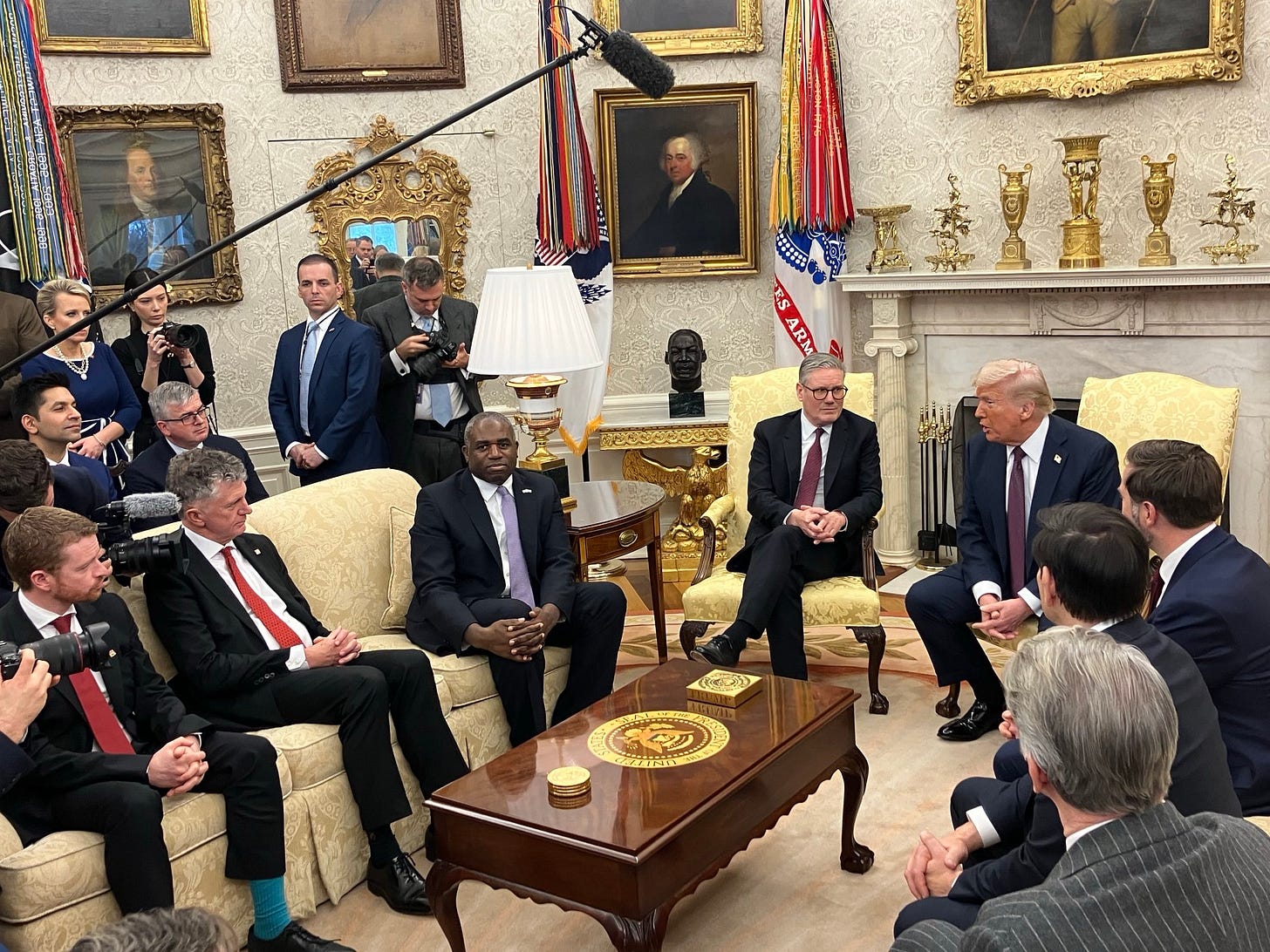
KEY POINTS:
The illegal invasion of Ukraine entered its third year. Prime Minister Keir Starmer flew to The White House, meeting President Trump. The leaders discussed Ukraine and other issues, with Mr Trump seemingly supporting Mr Starmer’s Chagos deal, accepting the offer of second State Visit, and nudging the view that Britain would avoid tariffs.
Ahead of his Washington trip, Mr Starmer announced increases to defence spending and a cut to foreign aid. Analysts were sceptical of increase, arguing that it involved accountancy tricks rather than substantial capital increases. Defence procurement will be integral to any meaningful change.
Foreign Secretary David Lammy delivered a statement on Ukraine in the House of Commons, announcing a sanctions package among other measures. Shadow Foreign Secretary Priti Patel urged the Government to consider diverting money from the 0.5% official development assistance (ODA) budget into defence.
Ukraine and the United States continued to dominate Britain’s foreign policy bandwidth. For clarity on how the strategy developed, let’s unpack this week’s movements chronologically. On Monday, Britain joined European partners and Five Eye nations in announcing a significant sanctions package, the largest since the war began; naturally, Labour shoe-horned in its ‘Plan for Change’ strategy to the press release.
Noted
Mr Lammy was gifted a watch by former United States Secretary of State Antony Blinken, which the Foreign Secretary then purchased for £695, per recent transparency documents.
In the Commons, Foreign Secretary David Lammy delivered a long statement on Britain’s ongoing support for Ukraine, and fielded questions from dozens of MPs. An accompanying press release quoted the Foreign Secretary as saying "every military supply line disrupted, every rouble blocked, and every enabler of Putin’s aggression exposed is a step towards a just and lasting peace, and towards security and prosperity in the UK as a part of this government’s Plan for Change.”
The following day, Prime Minister Keir Starmer announced Britain would increase its defence spending and cut foreign aid. The former would hit 2.5% GDP by 2027, and 3% in the next Parliament, while the latter would be reduced from 0.5% to 0.3% GNI. There would be more money for the intelligence services, he said. Britain’s foreign policy is now NATO first.
Quoted
“We must change our national security posture, because a generational challenge requires a generational response. That will demand some extremely difficult and painful choices, and through those choices, as hard as they are, we must also seek unity—a whole-society effort that will reach into the lives, the industries and the homes of the British people.”
Prime Minister Keir Starmer
The announcement was met with political support from many - most Labour MPs and commentariat pundits, who applauded its signalling - and concern from others. The latter camp included those frustrated by the cuts to aid, and analysts and defence folk who argue the defence spend is not far enough.
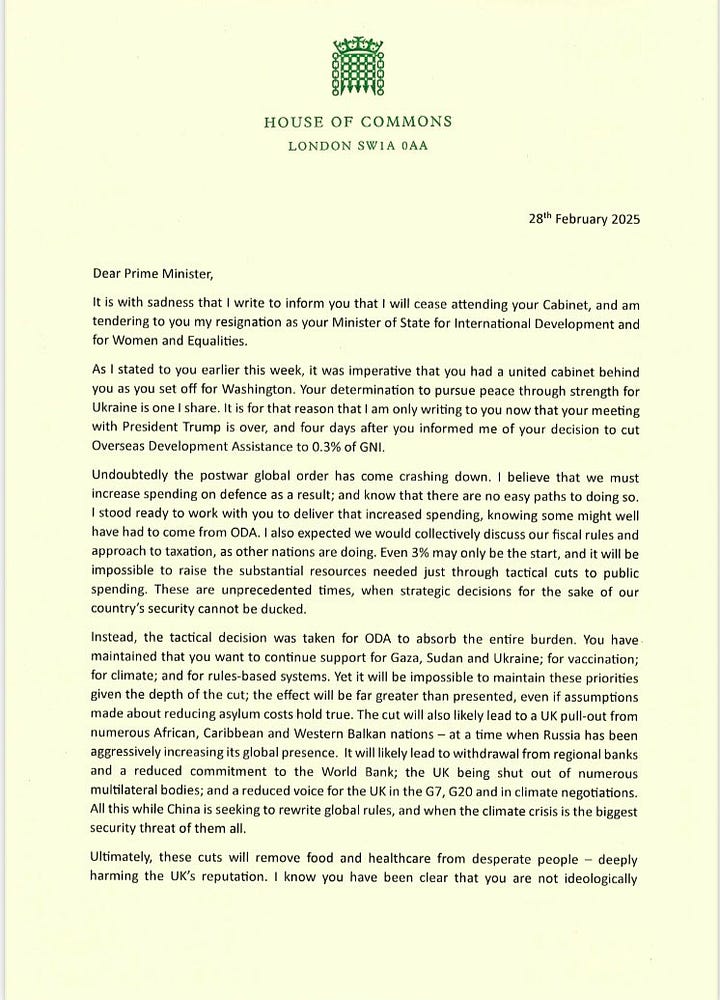
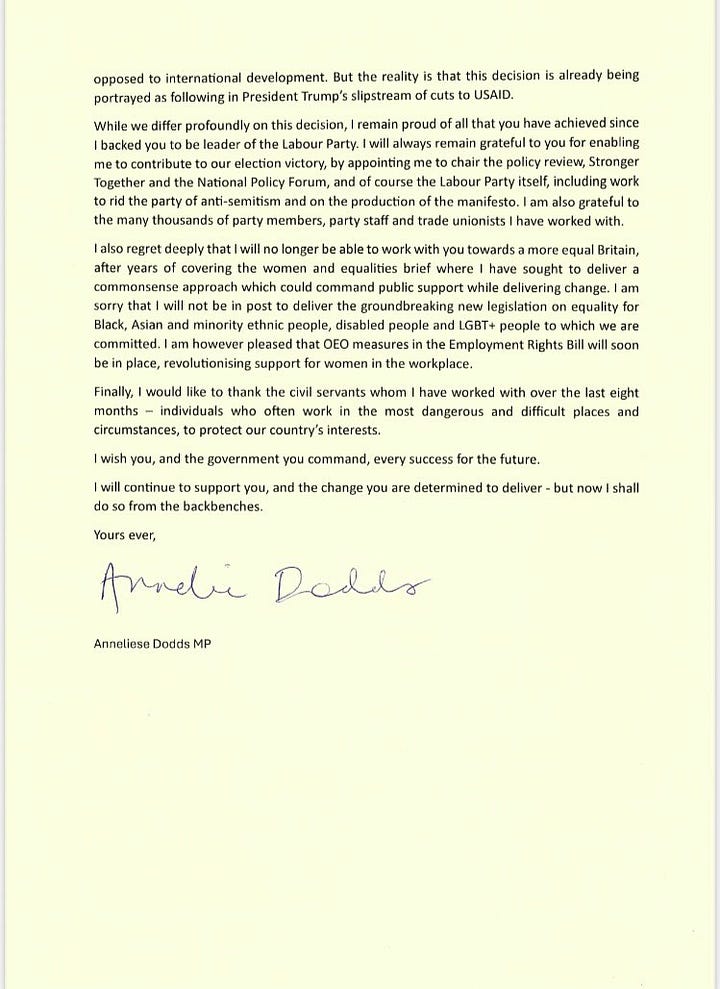
International Development Minister Anneliese Dodds resigned on Friday; she told the Prime Minister she had delayed her resignation until after his meeting with President Donald Trump, saying it was "imperative that you had a united cabinet behind you as you set off for Washington".
Noted
As discussed in previous Telegrams, Defence Secretary John Healey is in the process of trying to reform the Ministry of Defence. Part of this overhaul concerns procurement, which has long been criticised as poor and overly expensive. Regardless of changes, it will take years for most of them to be felt.
Tucked further was an announcement that a National Security Strategy would be published sometime before June - a previously unmentioned document. Awkwardly, Mr Lammy had recently criticised the United States’ cutting of overseas aid, calling it a “big strategic mistake” that allows China to further its global influence, and a much-heralded Soft Power Council was launched less than two months ago.
Analysts and economists sought to get to the bottom of the numbers. Quoted in The Financial Times, the Institute for Fiscal Studies denounced it as a “misleadingly large figure.” “This figure only seems to make sense if one thinks the defence budget would otherwise have been frozen in cash terms,” Ben Zaranko, IFS associate director, told the paper. On aid, some context is again useful. Nearly 40% of the government’s current official development assistance (ODA, or foreign aid to you and I) is currently going on “asylum backlogs [and] paying for hotels”, in the words of Mr Starmer.
Regardless of the technical and accounting aspects of the announcement, it achieved the top-line political impact needed. Under President Donald Trump, the offer is clear: if you want to sit at the table and discuss security and defence measures, you buy yourself access by increasing defence spending. In this case, praise arrived almost instantly: US Secretary of Defense Pete Hegseth tweeted “Just got off the phone w/ John Healey MP — the UK Secretary of State for Defense — who confirmed they will increase defense spending to 2.5% of GDP, and eventually much further. A strong step from an enduring partner.”
Noted
Not pleased with Mr Starmer’s defence posture? Steve Bannon.
The ‘godfather of MAGA’ spoke to Britain’s left-wing New Statesman magazine this week, and said “Your national healthcare system is under water right now… The British army can’t take a position in Ukraine, and you certainly can’t pay to underwrite it from the British Treasury. You don’t have the money, the resources. So you need to start focusing back on England and embrace it. I just think it’s insanity.”
Mr Starmer then flew to Washington to meet President Donald Trump, hot on the heels of President Emmanuel Macron. The Prime Minister’s strategy, underpinned by his new Ambassador, Peter Mandelson, is not to criticise Mr Trump’s recent actions around Ukraine to the same degree as his European counterparts, and to utilise Mr Trump’s affection for the Royal Family as a key offering for the transactional President. In taking a more moderate line, he told the media "President Trump has changed the global conversation over the last few weeks. And it has created an opportunity. Now, we must get the fundamentals right"; comments delivered at a British Embassy reception echoed this, noting the best days were to come for the Special Relationship. An accompanying press release emphasised the technology and AI relationship, an area diplomats and industrialists are keen to grow under the two leaders.
Quoted
“So this week, when I meet President Trump, I will be clear. I want this relationship to go from strength to strength. But strength in this world also depends on a new alliance with Europe. As I said in Paris last week, our commitment to European defence and security is unwavering, but now is the time to deepen it. We will find new ways to work together on our collective interests and threats, protecting our borders, bringing our companies together and seeking out new opportunities for growth.”
Prime Minister Keir Starmer
The meeting between the two leaders had consequential diplomatic impact for Britain. First, Mr Starmer offered the President a letter from King Charles III, inviting Mr Trump for an unprecedented second State Visit to the United Kingdom. Accepting, Mr Trump added “He is a great gentleman. A great, great gentleman…Beautiful man, a wonderful man and we appreciate I've known him, gotten to know him very well actually.” Second, the President seemed to have been supportive of Mr Starmer’s Chagos movements. Third, he indicated Britain may avoid his punitive tariffs. And fourth, Mr Trump didn’t offer a hard no on the prospect of some sort of US involvement in safekeeping Ukraine. Time will tell what transcends from words to action.
2. Indian trade diplomacy
KEY POINTS
Business and Trade Secretary Jonathan Reynolds and Investment Minister Poppy Gustafsson visited India to push forward Free Trade Agreement (FTA) negotiations.
The British Government has reaffirmed India as a trade priority but has not set a timeline, causing frustration among Indian negotiators.
Engaged in formal talks with Commerce Minister Piyush Goyal, Reynolds toured key UK businesses in India, and announced £100m in new trade and investment deals.
Gustafsson visited Mumbai and Bengaluru to attract Indian investment in UK high-growth sectors like advanced manufacturing, clean energy, and financial services.
While economic ties are strengthening, the path to a finalised UK-India trade deal remains uncertain.
Jonathan Reynolds, the Business and Trade Secretary, and Poppy Gustafsson, the Investment Minister, were the latest in a stream of senior Labour politicians to touch down in India in an effort to massage a Free Trade Agreement closer into existence.
It’s worth briefly recapping how we got here. Britain and India have been engaged in negotiations for a Free Trade Agreement (FTA) since January 2022, following the "Enhanced Trade Partnership" established in May 2021 under the premiership of former Prime Minister Boris Johnson.
Quoted
“A trade deal with India’s booming economy offers huge benefits for British businesses, workers and consumers. As we take our historic partnership with India to the next level, the UK’s independent trade policy is creating jobs, increasing wages and driving innovation across the country.”
Boris Johnson, Prime Minister
The British Government ran a consultation in 2021 to prepare for these negotiations, with the Conservative government initially aiming for an interim agreement to secure early benefits. Johnson set an arbitrary deadline for completion by Diwali 2022, but this was later abandoned in favour of prioritising the quality of the deal over speed. By October 2022, a majority of the chapters had been closed, though no final agreement was reached. The House of Lords International Agreements Committee, among others, criticised the negotiations for having vague objectives and questioned whether a comprehensive deal could be achieved in the short term, citing India's history of cautious trade agreements. Concerns around work visas and immigration numbers also appeared in Parliamentary debates from time to time.
When Labour won the General Election last year, it confirmed that India remains a priority in its trade negotiation programme. However, there is no indication of a specific timeline for concluding the agreement, and frustration from some Indian interlocutors over the pace (or lack thereof) Labour has injected into the pursuit of the FTA.
Noted
India has been the second biggest source of Foreign Direct Investment into the UK for five consecutive years in terms of number of projects. In terms of value, the most recent stats show a 28% year-on-year increase in investment stock at the end of 2023.
So, we find ourselves in Delhi; Mr Reynolds and Ms Gustafsson went their separate ways in-country on different missions. For the former, much of the time was spent with Commerce Minister Piyush Goyal for two days of formal talks. Mr Reynolds toured BT India’s Gurugram office, a major UK employer, and attended a joint visit to Delhi’s National Crafts Museum to engage with Indian commerce and artisans. Naturally, Reynolds positioned the trade deal as a key element of Labour’s Plan for Change, emphasising economic growth and stability. 17 new export and investment deals were announced, totalling over £100m, with a focus on insurance companies who can now enter the market with new rules.
Quoted
“Tech and life sciences are two huge growth sectors for the UK economy that feature at the heart of our Industrial Strategy. I’m proud that government support has helped some of our finest businesses in these sectors to expand into the exciting Indian market.
Jonathan Reynolds, Business and Trade Secretary
Meanwhile, the Investment Minister spearheaded efforts to attract Indian capital into Britain, visiting Mumbai and Bengaluru, India’s financial and tech hubs. She addressed investors, pitching the UK as the best and most connected destination for Indian businesses, highlighting India’s role as the UK’s second-largest source of foreign direct investment (FDI). With a focus on high-growth sectors like advanced manufacturing, clean energy, and financial services, she reinforced Britain’s pro-business stance and economic stability. While Reynolds concentrated on trade policy, Gustafsson’s mission was to secure investment that supports long-term UK growth.
Noted
How much does it cost to take Chancellor Rachel Reeves for lunch? Somewhere in the region of £35 (China Council for the Promotion of International Trade) to £18 (J.P. Morgan), per newly released transparency documents.
3. Mongolia in London
KEY POINTS
Indo-Pacific Minister Catherine West hosted Mongolia’s Deputy Prime Minister Amarsaikhan Sainbuyan in London for the first annual talks.
Britain is Mongolia’s largest foreign investor, mainly due to Rio Tinto’s stake in the Oyu Tolgoi copper mine.
Discussions addressed rising global tensions, reaffirmed commitment to the UN Charter, and opposed threats to territorial integrity.
Back in London, Indo-Pacific Minister Catherine West hosted Mongolia’s Deputy Prime Minister Amarsaikhan Sainbuyan for the first annual UK-Mongolia political dialogue.
Mongolian ties have been somewhat of an interest area for the Foreign Office since the two nations celebrated 60 years of diplomatic relations in 2023. The country was hit hard by Covid-19, due to a sharp decline in the demand for mineral products and prolonged closures of borders with China (mineral exports account for about 80% of total exports and 90% of exports go to China.) Consequently, Mongolia’s GDP growth fell from 5.6% in 2019 to -4.6% in 2020 and gradually increased to 5.0% in 2022 and 7.0% in 2023.
Perhaps sensing an opening, senior officials have visited back and forth, and the UK is the largest foreign direct investor in Mongolia, thanks to mining firm Rio Tinto’s investment in Oyu Tolgoi – one of the world’s largest copper mines. It’s jointly owned by the Government of Mongolia (34%) and Rio Tinto (66%), with Rio Tinto managing the operation.
Militarily, Mongolia contributed more than 6,000 troops to Afghanistan in support of NATO operations there, and their armed forces served alongside the UK’s, including as part of the Kabul Security Force (KSF) which was set up to protect NATO advisers operating in the Afghan capital.
Noted
Britain was the first Western nation to recognise Mongolia diplomatically.
This week’s meeting saw geopolitical and economic discussions. Both sides “noted deepening geopolitical tensions, stressed their commitment to upholding the principles of the UN Charter, and called on all countries to refrain from using force against the territorial integrity and political independence of any state.” Mr Sainbuyan also met Gareth Thomas MP, the Minister for Export Affairs, to “discuss expanding cooperation and increasing jobs in both countries.”
This is of particular importance to Mongolia: neighbouring Russia is the single biggest supplier of its fuel and energy, and the other neighbour China is the biggest export destination. To this end, Britain’s stated offer is threefold:
Trade & Investment: The UK is Mongolia’s largest investor, with $15 billion in Rio Tinto and other UK investments, plus trade opportunities and UKEF-backed infrastructure support.
Democracy & Governance: The UK supports Mongolia’s commitment to democratic values and the international rules-based order.
Economic Development: Collaboration in education (Chevening scholarships, Cambridge Partnership) and climate initiatives is driving transformative change.
UN SECURITY COUNCIL
Statement by Fergus Eckersley, UK Minister Counsellor, at the UN Security Council meeting on UN Peacekeeping Operations
UK Statement at the 58 Human Rights Council during the Enhanced Interactive Dialogue on Sudan. Delivered by the UK’s Permanent Representative to the UN & WTO, Simon Manley
Quoted
“HMG remains well positioned in Iraq. The UK is a trusted partner, visibly committed to the security of the region... demonstrated through tangible support to the Iraqi Government."
A recent Conflict, Stability and Security Fund update
DEFENCE
John Healey, Defence Secretary, hosted his counterpart Nikos Dendias in London.
Luke Pollard, Minister for the Armed Forces, met his NATO counterparts at various points over the week.
The Royal Navy’s Mine and Threat Exploitation Group (MTXG) successfully spent time with JS Bungo, a Uraga-class mine counter measure vessel from the Japan Maritime Self-Defence Force.
Julia Longbottom, Ambassador to Japan, hosted a meeting between RAF Major General Marshall and her Japanese counterpart.
FOREIGN AFFAIRS
Keir Starmer, the Prime Minister, spoke to the President of France, Emmanuel Macron.
David Lammy, the Foreign Secretary, met Gen. Keith Kellog, the US Special Presidential Envoy for Russia & Ukraine.
Mr Lammy also issued a statement after Thailand deported 40 Uyghur Muslims to China.
Mr Lammy also delivered a video message to the 2nd ASEAN Future Forum (AFF), hosted by Diplomatic Academy of Viet Nam, and Viet Nam Ministry of Foreign Affairs.
Hamish Falconer, Minister for the Middle East, hosted members of the National Assembly of Pakistan.
Britain, Canada, Iceland and Norway underlined non-recognition of the illegal so-called Presidential elections in Georgia’s Abkhazia region on 15 February 2025.
Hilary Benn MP met with the Tánaiste, Minister for Foreign Affairs, Trade and Minister for Defence, Simon Harris TD, at Iveagh House, Dublin.
SANCTIONS
Britain announced its largest sanctions package to date on Russian and other foreign entities for propping up the war in Ukraine.
SOFT POWER
Britain helped train 30 Ghanaian journalists to communicate science and technology more clearly.
Pakistan’s Chief Whips visited Britain to learn about Parliamentary procedure.
Britain continues to train Fijian police officers.
TRADE & ECONOMY
Rachel Reeves, the Chancellor, attended the G20 Finance Minister’s meeting in South Africa. The USA, EU, Japan, India, China, Brazil and Mexico did not send representatives.
Britain’s Competition & Markets Authority signed an MoU with the Commissioner of Competition of Canada regarding international cooperation on the application of national competition laws.
AI AND EMERGING TECH
Ministers have delayed plans to regulate artificial intelligence as the UK government seeks to align itself with Donald Trump’s administration on the technology, the Guardian reported.
Poppy Gustafsson, Investment Minister, launched a Responsible AI Toolkit with Indian counterparts.
AID
Britain suspended some aid to Rwanda, in light of its support of M23 in the DRC.
DIPLOMATS
Sarah MacIntosh DCMG has been appointed British High Commissioner to Australia. This is a significant move: she was most recently the Prime Minister’s Adviser on International Affairs and Deputy National Security Adviser.
Neil Bradley has been appointed British High Commissioner to the Republic of Namibia.
Danielle Dunne presented her credentials to President Santiago Peña as the new British Ambassador to Paraguay.
Edward Ferguson, Ambassador to Serbia, joined European counterparts and met with women leaders of Serbian NGOs who have faced unjustified political and media attacks in recent weeks.
Kemi Badenoch, Leader of the Opposition, delivered her first major foreign policy speech. Formed of six main points, the Conservative leader sought to differentiate her approach from both Labour and her own party’s recent 13-year stint in Downing Street.
Noted
Preeminent historian and author Niall Ferguson was in the audience of Ms Badenoch’s speech. Rumours swirled that he had helped draft parts of it too.
Delivered with bad audio equipment in right-wing think tank Policy Exchange’s headquarters, and peppered with the horns of tractors protesting the government’s inheritance tax plans for farmers, her speech pivoted on six points:
Acknowledged a Changing World – Ms Badenoch argued that the global order was shifting, with the "Pax Americana" weakening or ending. She stated that the UK needed to accept this reality, reassess how nations interacted, and ensure it was not left vulnerable in an increasingly volatile world.
Placed National Interest First – She stressed that the UK’s foreign policy should have prioritised national security, economic strength, and sovereignty. She warned that internationalism and progressive ideals should not have been allowed to override Britain’s core interests.
Called for an End to Naivety in Global Affairs – While she recognised the importance of alliances like NATO and trade partnerships, Ms Badenoch cautioned against blind trust in international law and institutions. She argued that if these bodies were co-opted by activists or authoritarian regimes, Britain needed to be prepared to disengage.
Emphasised the Need for National Resilience – She criticised cultural debates and historical self-flagellation as distractions that had weakened the country. She believed that a strong, united society with confidence in its values, history, and institutions was essential for national security.
Learned from Past Foreign Policy Failures – She highlighted the West’s failures in Afghanistan, Libya, and Ukraine, arguing that Britain had been too hesitant and reactive. According to her, weakness had emboldened aggressors like Putin, and the UK needed to take a firmer, more strategic approach to global conflicts.
Advocated for Rebuilding Military and Economic Strength – Ms Badenoch called for a major increase in defence spending and a reformed, more efficient military. She linked economic growth to national security, advocating for lower taxation, reduced bureaucracy, and investment in key industries to restore Britain’s global standing.



